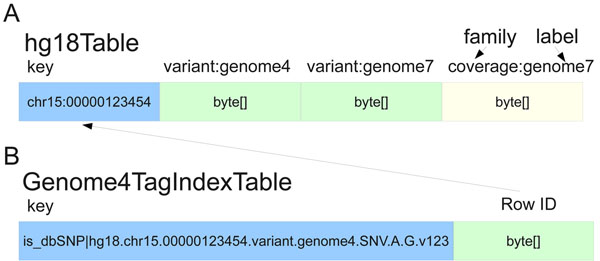Difference between revisions of "Template:Article of the week"
Shawndouglas (talk | contribs) (Updated article of the week text.) |
Shawndouglas (talk | contribs) (Updated article of the week text.) |
||
| Line 1: | Line 1: | ||
<div style="float: left; margin: 0.5em 0.9em 0.4em 0em;">[[File: | <div style="float: left; margin: 0.5em 0.9em 0.4em 0em;">[[File:Fig1 OConnor BMCInformatics2010 11-12.jpg|240px]]</div> | ||
'''"[[Journal: | '''"[[Journal:SeqWare Query Engine: Storing and searching sequence data in the cloud|SeqWare Query Engine: Storing and searching sequence data in the cloud]]"''' | ||
Since the introduction of next-generation DNA sequencers the rapid increase in [[Sequencing|sequencer]] throughput, and associated drop in costs, has resulted in more than a dozen human [[Genomics|genomes]] being resequenced over the last few years. These efforts are merely a prelude for a future in which genome resequencing will be commonplace for both biomedical research and clinical applications. The dramatic increase in sequencer output strains all facets of computational infrastructure, especially databases and query interfaces. The advent of cloud computing, and a variety of powerful tools designed to process petascale datasets, provide a compelling solution to these ever increasing demands. | |||
In this work, we present the [[SeqWare]] Query Engine which has been created using modern cloud computing technologies and designed to support databasing information from thousands of genomes. Our backend implementation was built using the highly scalable, NoSQL HBase database from the Hadoop project. We also created a web-based frontend that provides both a programmatic and interactive query interface and integrates with widely used genome browsers and tools. ('''[[Journal:SeqWare Query Engine: Storing and searching sequence data in the cloud|Full article...]]''')<br /> | |||
<br /> | <br /> | ||
''Recently featured'': [[Journal:Launching genomics into the cloud: Deployment of Mercury, a next generation sequence analysis pipeline|Launching genomics into the cloud: Deployment of Mercury, a next generation sequence analysis pipeline]], [[Journal:Benefits of the community for partners of open source vendors|Benefits of the community for partners of open source vendors | ''Recently featured'': [[Journal:SaDA: From sampling to data analysis—An extensible open source infrastructure for rapid, robust and automated management and analysis of modern ecological high-throughput microarray data|SaDA: From sampling to data analysis—An extensible open source infrastructure for rapid, robust and automated management and analysis of modern ecological high-throughput microarray data]], [[Journal:Launching genomics into the cloud: Deployment of Mercury, a next generation sequence analysis pipeline|Launching genomics into the cloud: Deployment of Mercury, a next generation sequence analysis pipeline]], [[Journal:Benefits of the community for partners of open source vendors|Benefits of the community for partners of open source vendors]] | ||
Revision as of 17:04, 22 February 2016
"SeqWare Query Engine: Storing and searching sequence data in the cloud"
Since the introduction of next-generation DNA sequencers the rapid increase in sequencer throughput, and associated drop in costs, has resulted in more than a dozen human genomes being resequenced over the last few years. These efforts are merely a prelude for a future in which genome resequencing will be commonplace for both biomedical research and clinical applications. The dramatic increase in sequencer output strains all facets of computational infrastructure, especially databases and query interfaces. The advent of cloud computing, and a variety of powerful tools designed to process petascale datasets, provide a compelling solution to these ever increasing demands.
In this work, we present the SeqWare Query Engine which has been created using modern cloud computing technologies and designed to support databasing information from thousands of genomes. Our backend implementation was built using the highly scalable, NoSQL HBase database from the Hadoop project. We also created a web-based frontend that provides both a programmatic and interactive query interface and integrates with widely used genome browsers and tools. (Full article...)
Recently featured: SaDA: From sampling to data analysis—An extensible open source infrastructure for rapid, robust and automated management and analysis of modern ecological high-throughput microarray data, Launching genomics into the cloud: Deployment of Mercury, a next generation sequence analysis pipeline, Benefits of the community for partners of open source vendors










